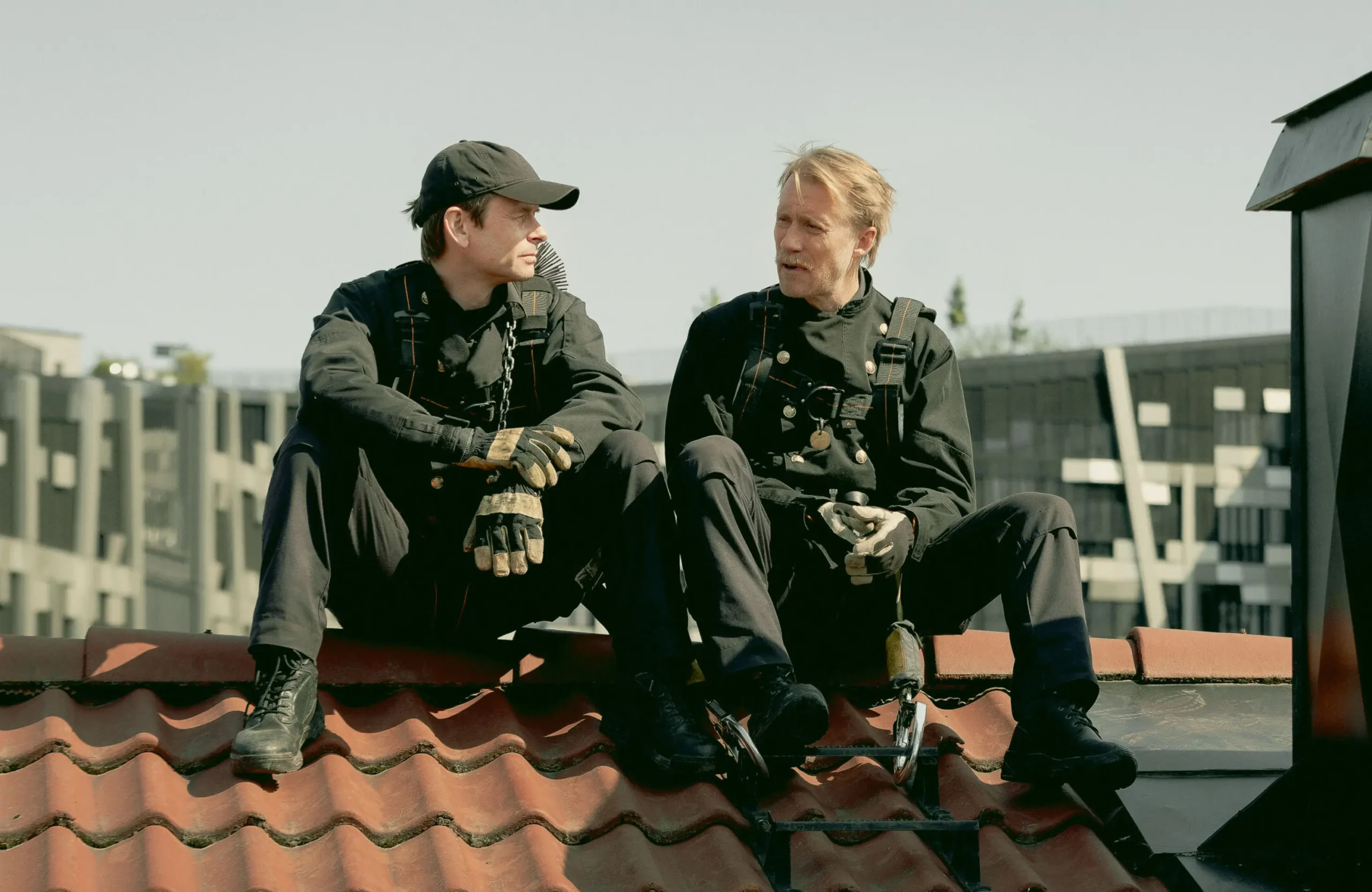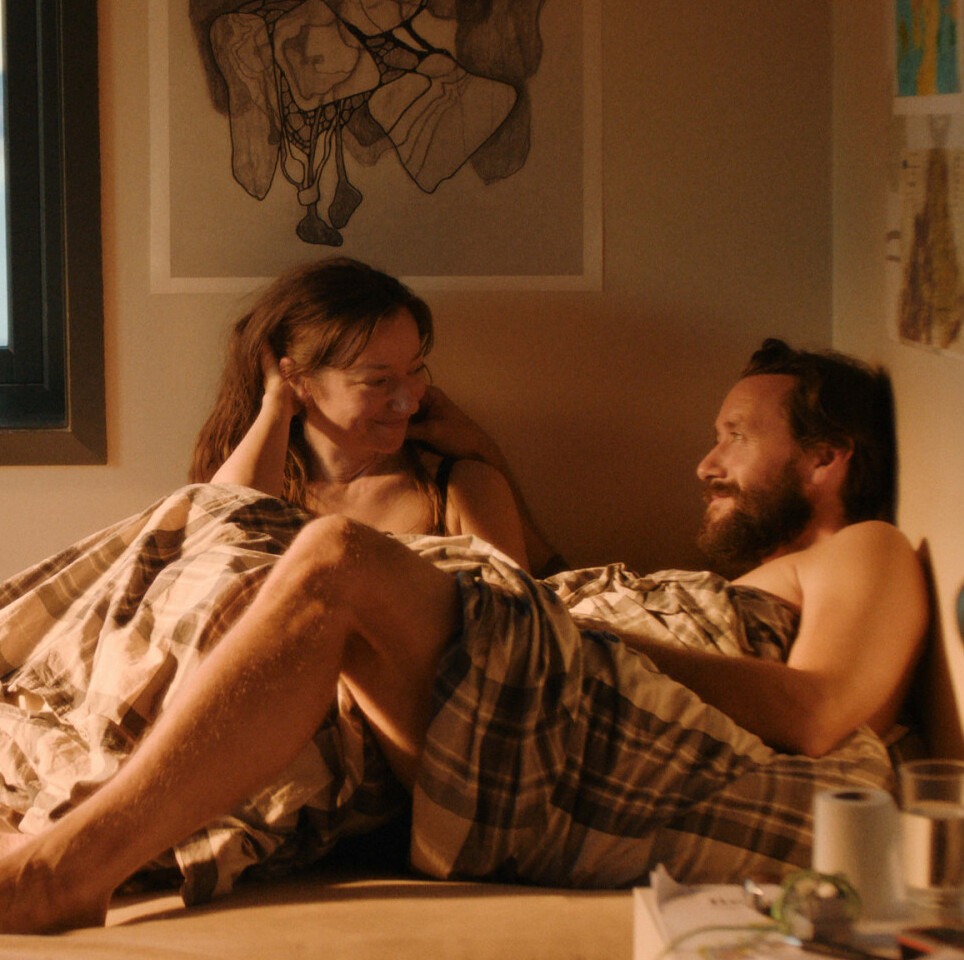I first heard about the film Sex when it premiered in Berlin in mid-February, and I remember the description that stuck with me: “Sex follows two men in heterosexual marriages, who experience an unexpected event that challenges them to reconsider their understanding of sexuality, gender, and identity. One of them has a sexual encounter with another man, not considering it either an expression of homosexuality or infidelity, and then discusses it with his wife. The other man encounters questions about his gender identity in his dreams, which causes confusion and leads him to question how much of his personality has been shaped by the views of others.” This description made me remember the film and piqued my interest, and when I heard it would be screening at the Slobodna Zona festival, I was thrilled that both I and our audience would finally have the chance to watch it.
As I watched the entire Sex Dreams Love trilogy by Dag Johan Haugerud, two of which (Sex and Love) the Belgrade audience will have the chance to see on November 9th as part of the Slobodna Zona festival, the first thing that struck me was how all the dialogues are gentle and non-judgmental, even when the characters have differing opinions. The relationships are so natural, the atmosphere so human, warm, and completely filled with love, acceptance, and understanding. Such topics are rarely explored in our region, and I would say never in this way. However, even though cultural differences and local contexts are evident, Haugerud’s themes are recognizable to everyone, regardless of language, faith, or ethnic background. Identity—whether sexual, religious, or national—remains a timeless and inexhaustible topic in all artistic disciplines. The key for an artist is to approach these questions in an innovative and non-trivial way, and this is exactly what the director has succeeded in. His films confront viewers with everyday human situations: struggles, decisions, doubts, turning points, and changes. I’ve always believed that these ordinary yet complex themes are the hardest to bring to the screen. In this context, Haugerud’s work offers an extraordinary insight into human nature, shedding light on the complexity of relationships that shape our lives.
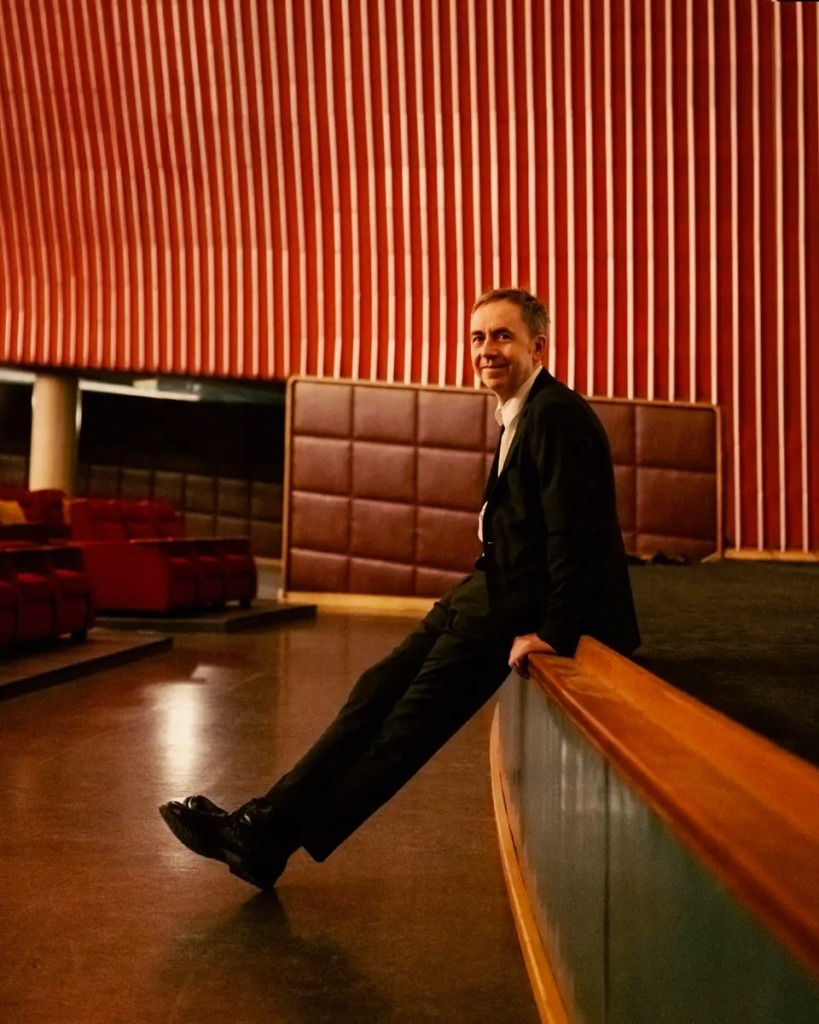
Courtesy of Dag Johan Haugerud
Given the current social and political challenges, films like these encourage dialogue about diversity and acceptance, offering perspectives that we often need but rarely see in our local context. In a world that is becoming increasingly polarized, Haugerud’s approach can serve as a bridge between different identities and experiences, encouraging the community to reflect on their own humanity and mutual connectedness. In light of all this, I asked director Dag Johan Haugerud a few questions about some of the gentle and important themes he presents to the audience in simple language—what they mean to him, what messages he’s sending, and why chimney sweeps were so interesting to him. Below, I cannot guarantee there will be no spoilers; if you’re particularly sensitive to that, I suggest caution, but I think with films like these, it’s impossible to spoil them, as there’s no dramatic twist or big revelation, just a personal experience that depends entirely on you, regardless of how much you know or don’t know about the film.
As someone who started as a writer and still considers that his main profession, Dag Johan Haugerud entered the world of film somewhat by chance. He is a screenwriter and director known for his critically acclaimed novels, feature films, and short films. His feature film I Belong (2012) won the Amanda Award and the Kanon Awards for Best Film, Direction, Screenplay, and Supporting Actress. He had great success with Beware of Children (2019), which, in addition to winning the Dragon Award for Best Nordic Film and Best Actor at the Gothenburg Film Festival, also won a record-breaking nine Amanda Awards following its international premiere in Venice, including Best Film, Director, Screenplay, and Best Actor. He also won the Film Critics’ Award, the Solvklumpen Award from Norwegian cinema managers, and the Nordic Council Film Prize. Dag Johan Haugerud has also written several novels published by the publishing house Oktober and has created many critically acclaimed short films. Sex, the first film in the Sex-Love-Dreams trilogy, premiered at the 2024 Berlinale in the Panorama section, where it won three awards. It sounds terrible, but they offered me to make a film. I had no trouble with that. I feel a little embarrassed to say that because I know people who have been struggling for years to make a film. But my producer asked me if I wanted to make a film, and I said yes, as long as I could do it my way. And it just happened. There were some small obstacles, of course. But then it just grew. Now I’ve been making films for over 20 years, but I still consider myself a writer.
The starting point is understanding. Haugerud begins his response to my first question about Sex. How the dialogues are written so gently, and the conversations flow very naturally, with a lot of understanding, even when the characters don’t agree. How important was it for him to create a safe space for both the characters and the audience, and how did he develop this unique approach to addressing such topics? He continues: When we talk about things like sexuality or feelings related to sex and infidelity, the conversation often stalls because it becomes so uncomfortable, that you just want to leave the conversation. That’s why I wanted to write it without stressing conflict and present a scenario were the characters approach each other with patience and love, and a wish to understand. From the very beginning, they need to meet with some kind of love and patience. That’s what it’s about. It doesn’t matter if the other person says something bad. Another specific thing I liked is that the protagonists are middle-aged people, especially heterosexual men. That’s not something you often see in identity-related topics, which are usually found in coming-of-age or teenage narratives, often due to the stigmatization of aging and sexuality in middle-aged people.
Let’s go back to some more technical aspects. Making a trilogy is not a common thing, and it’s a very ambitious directorial move, which has been excellently executed here. Haugerud talks to me about the inspiration and challenges of creating such a project: I wanted to make a bigger project… My previous film was quite long. It was just one film that lasted almost three hours. And then I wanted to make a much shorter film after that. Because I think the short format is quite interesting. But we didn’t get the money to do it. The consultant we were talking to really liked the previous film, and she wanted me to make something truly big, an epic film. So, I thought, okay, I’ll make an even bigger project. I found it very interesting, it gave me the opportunity to develop a theme in a much broader sense, with different perspectives and a higher level of complexity. But it was also a challenge to make three films that should look different and at the same time have similarities in style. It’s like creating a much broader picture—a picture that contains three very different images. It was really fun working with the production designer. And working with the costume designer. We really had a good time. And the same team worked on all three films, so that was really good. Because then you really get to know each other. And the last film was much easier than the first. You can feel that they are somehow connected.

Getty images
I was curious about how he managed to present complex themes such as gender and sexual identity in men, especially in such a natural way and through ordinary human actions, particularly in a world where toxic masculinity is so prevalent. Haugerud answers: If you think these issues are important and there’s something that worries people about them and something they think about, then these topics shouldn’t just be reserved for young people. Because now there’s a lot of talk about this among young people, but we must also consider that these are issues that existed among older people as well, even if they didn’t talk about them as much. So, I think it’s equally important for everyone to embrace these issues and talk about them and think about them. I believe that when we read and hear a lot about gender, it’s something we start thinking about ourselves. And thinking about it, if all of these issues are somehow connected to me, are they also my concern? The character in the film who has erotic dreams about David Bowie and that awakens something in him was especially interesting to me. Also, I wanted to write this script specifically for this cast because I had already worked with them, and I wanted to work with them again. So, it was written for them, and also in some kind of dialogue with them. I presented the idea at the beginning and asked if it was something they wanted to participate in. And they also found it interesting, especially one of them. He thought a lot about what it really means to be a woman. What does it mean to be a man? Obviously, he somehow feels like a man, but what is that feeling? What does it entail? In Sex, there are no answers to these questions, nor is it ever the focus. What dominates is the feeling. For example, when the wife of one of the main characters asks if he wants to dress as a woman, he knows he doesn’t, but he somehow still feels like a woman because of the way the man, in this case, David Bowie, looks at him and desires him. This approach was very interesting to me. Just masculinity and femininity as such. Nothing more, just concepts. I think the audience will clearly understand what the director wanted to say, because these are discourses that appear in various ways and in different contexts throughout human life, whether subconsciously or consciously.
When it comes to such gentle films, I’m always curious whether the director had the intention to break some stigmas, send strong messages, or simply present often marginalized segments of the complexity of human life. Haugerud gives me a similarly gentle response: It’s a very quiet film. It’s not a film that loudly communicates its message. But I think that’s my strategy. By having a gentle conversation about it, perhaps, if I’m lucky, I’ll encourage the audience to think about it. I think if you want to deliver a message loudly and aggressively through a film, you won’t succeed in reaching people. It’s very important to understand that these protagonists are really good people. They wish well for each other. But, of course, there is a message, or maybe not a classic message, more a desire to raise certain questions. And to get people to think again about certain things. What is sexual identity? Can sexual identity be something other than sexuality itself? Aren’t these two different things? Because we tend to somehow connect them. But is it possible to have a sexual relationship with someone of the same sex without considering yourself gay or bisexual? But is it possible to have a sexual relationship with a person of the same sex without identifying as homosexual or bisexual? And even though in most cases, coming out of the closet is liberating and something I hope most will have the courage to do, can it also, to some people, feel narrowed?

Photo: Motlys
In our conversation, I couldn’t help but laugh as I compared our very different environments—Balkans and Norway. Here, people often use labels and boxes in which they inevitably place others. Because of that, there is often a certain animosity toward identifying with specific groups, as people think it will somehow mark them, and of course, people don’t want to feel marked. Especially not here, because those labels can really destroy you. In the film Sex, there are also subtle themes of Christianity, portrayed as a kind of non-aggressive counterpoint to the themes of gender and sexuality. Haugerud responds to this comment with a half-laugh, beginning: Norway is actually not that much of a Christian country. It’s quite secularized. I also have to say that this is a typically Norwegian context. I think it can be said that sexuality here is quite liberated. Of course, homophobia exists everywhere. But I think most people here feel that it’s safe to come out as gay or LGBTQ. And of course, there are Christians in Norway just like everywhere else, people who have a strong personal faith that informs their choices. But my experience of Christians in film are that they are mostly portrayed as fanatics that eventually tend to do evil things. So I wanted to show a more nuanced version of what it’s like to have and everyday-faith and how that affect your thinking and behavior towards others.
If you ask me, he succeeded in that. The film manages to portray Christians in a gentle light. However, religion here was not something that was immediately noticeable; it’s not the central theme of the narrative following the main characters, but rather an incidental, regular, everyday thing. And again, it’s portrayed so naturally. “Natural” is the word that most often comes to my mind when trying to describe the events and dialogues in Haugerud’s films.
In this trilogy, people are just people, going through human things, through everyday, ordinary processes, in a natural way. I love such films. Films that just show people as ordinary people. Understanding, disagreement, turning points in life. As well as religion and love. Romantic, familial, and friendly love. Because in Sex, we see characters who are complex, who have hobbies, love music, who are good parents. One of the main characters, played by actor Thorbjørn Harr, discusses many things with his son that are still somewhat taboo to talk about on our side of the world, especially with children. For example, menstruation, pain, menopause… with a 13-year-old boy. I think it’s important to destigmatize such good fathers and not glorify the absent ones.
Haugerud agrees with my rather long monologue with agreement, and than adds : I also think that going through menstruation and menopause affects the male population too. Because we are all connected in some way. It’s part of our lives, and if we are not aware of the biological issues that women face, we would be very backward. This is something that affects half of the population of this planet.
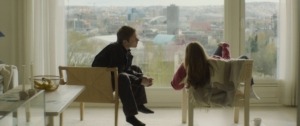
Photo: Motlys
Inspired by this answer, I immediately move on to the next question about tenderness and what tenderness means to him personally, as it is undoubtedly the feeling that dominates these films. How does he manage to convey it so well on screen?
That’s a difficult question. I think it’s about being aware of other people. And trying to greet them with some form of love. But tenderness is also affection, in a way. And an attempt to dare to show affection. I think that’s very important. Because you can feel affection for each other but not actually dare to show it. I also think tenderness can mean discovering yourself in a way. Showing your true self. And also having the courage to accept tenderness. Well, now I’ve said a lot of things. And I don’t think I thought about this before. The word ‘tenderness.’ It’s an interesting word. I think it also has to do with both the mind and the body. So it’s a concept that applies to both the physical and mental state.
As I mentioned earlier, while watching all three films, which form an anthology, I had the feeling that the themes intertwine and flow into each other across the different films. The themes addressed in Sex also appear in Love. Especially dreams and love… These are almost inseparable concepts in Sex. And it seems they lay the foundation for the other two films.
Yes, absolutely. The point was to make three films that deal with the same themes and questions but are treated in different ways, from different perspectives. And with different characters. Of different ages as well. In Dreams, almost all the characters are women. They are women from three generations. The main character is a young girl, she’s 17, and her mother, and then her grandmother. All of them have different thoughts about falling in love and sexuality. The initial idea was to try to talk about these themes in as many ways as possible. Of course, there are many more ways these themes can be explored in film, but that was our attempt.
Another thing that intrigued me in these films is that the plot is not really about showing, for example, sex, but about talking about it. It’s about uncovering emotions and relationships as such. If you were to ask me to categorize these films, I would say they’re slow; it seems like nothing is happening, but actually, a lot is happening. Just like life. Even if it’s just some already familiar scenes, like talking with friends about sex or love, those scenes aren’t exhausting or boring. They are not repetitive interactions that everyone already knows from countless films. These are situations and characters that pull you in to learn more about them. That’s one of the main reasons I think Dag Johan Haugerud has tackled some age-old themes in an innovative way. The very modest director adds: It’s not always possible to translate everyday life into films. But at the same time, what we do most in everyday life is talk to each other. And most of the conflicts in our lives come from the way we talk to each other. Misunderstandings and what people say to us. And how we are perceived by other people. So that’s very important to me. If you want to talk about everyday life, you have to show conversations between people.
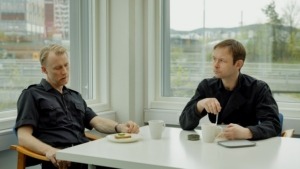
Sex, Photo: Motlys
I believe that one of the most important things in building the atmosphere of a film is the choice of locations and the spaces where the action takes place. The environment and the setting in which the characters find themselves in these films are always the same (the bedroom, kitchen, bathroom, work sites and construction sites in the city, often visible through a window or on a roof). The spaces remain constant, but the characters are deconstructed and go through different emotional phases, realizations, and conversations. What does this space mean in the film, and is it a free zone for our protagonists or perhaps a battlefield? And how should that communicate with the audience? Haugerud explains the beauty and symbolism of choosing a space very simply: I think the location is extremely important. In Sex, there was an idea to place them in this construction area where they live among new buildings, or where there are many new apartments. And where you can see construction cranes. The intention was to point out that these people, in some way, are also in the process of being built. They are somewhat lost because there are many questions they haven’t faced in life. They probably feel secure because they’ve been together for over 20 years. But something begins to collapse, and then they have to somehow reconstruct their lives. So, the location can be used as a metaphor for this construction work. In Love, they are always very close to the sea. So, really interesting conversations happen in a kind of safe space, far from home. But it was similar in Sex as well. I wanted part of these conversations to happen on a roof or by a river, or even in some open space. Because maybe it’s easier to talk in these open spaces, especially on a roof where there are no people and where you’re somewhat close to the sky. And there’s a lot of air around you. Also, by the water, where there is a different kind of tension than on land. That was the idea. But whether it works, we don’t know. But we always have an idea of how to use the location. Sometimes it works completely. Sometimes it works a little better, sometimes not so well, and sometimes it doesn’t work at all.
In Sex, there is also an underlying theory from philosopher Hannah Arendt and her theory of freedom. Specifically, the difference between the social and public spheres. When asked what the philosophy of freedom means to him, especially in the times we live in, with wars and genocides, the director responds: It means a lot to me. If we read Hannah Arendt, she obviously writes about many things. And it can be applied to many different aspects. I also think this is particularly interesting for these films in relation to the question of identity. Because I think that, especially in Norway, or probably in the whole Western world, identity questions have become more and more important. And I think that instead of freeing us, this somehow narrows our world. It becomes more restrictive. This is quite transferable to the social and public sphere. If you want to isolate yourself in a very small group, it’s really difficult to talk to a broader society. I think we need this in order to gain an understanding of the world in which there is more respect. And more tolerance toward others. I think philosophers have a big impact on us, whether we want them to or not. Because they are part of the big thoughts that happen beneath the surface in the broader society.
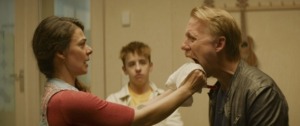
Photo: Motlys
Another interesting concept that appears most prominently in the film Love, but is subtly present in Sex as well, is the body as a battleground. It’s something familiar to most people, if nothing else because of artist Barbara Kruger. She demands that we reflect on how our identities are shaped within culture, through our representation, in language and imagery. I was curious about how this inherently feminist concept is connected to these films? And to the questions about the body raised in them? How is the body in these films connected to the body as a battlefield? I think the body is always a battlefield. For everyone. We always see how the body should look. We are constantly fighting with our own bodies to shape them and present them in the way we think they should look. We also have expectations about our sexuality. What we should love, how we should feel. I think for many people, it’s quite difficult to achieve a kind of sexual life that is truly good for them. Because we tend to try to adjust our sexuality to fit the partner or what the partner expects, or what society expects. So, control over our bodies – I think very few people really have it in any sense – and I think this is a struggle we face throughout our lives. But I also think we can overcome this struggle in some way, by trying to be honest about it, by trying to talk about it. Because if we don’t try to explain to people how difficult it can be, how will we solve it? I think openness about bodily functions and the body, how it looks, how it feels, is very important. The body will continue to be a battleground, but our approach needs to change.
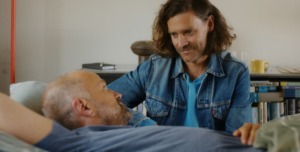 Photo: Motlys
Photo: Motlys
